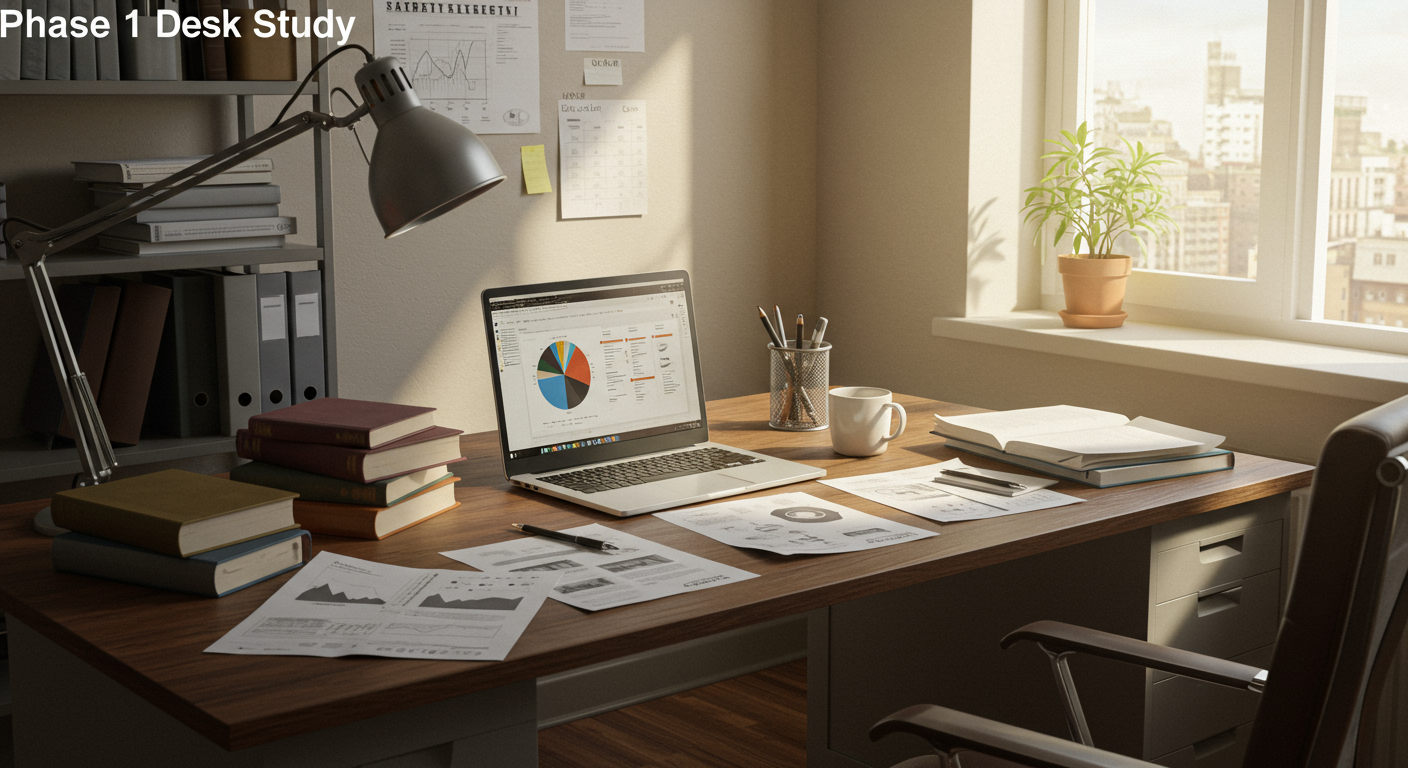In the realm of property development, land management, and environmental risk assessment, the Phase 1 Desk Study plays an indispensable role. It is the foundational step in the process of understanding a site’s environmental condition before any physical development, purchase, or major alteration occurs. Recognizing the importance of a Phase 1 Desk Study in project planning is essential for developers, investors, regulators, and environmental consultants alike, as it significantly influences project success, cost management, regulatory compliance, and risk mitigation.
What is a Phase 1 Desk Study?
A Phase 1 Desk Study is a preliminary environmental assessment focused on gathering and reviewing all existing information related to a site’s environmental status. This includes historical land uses, previous environmental investigations, regulatory records, geological and hydrogeological data, and other relevant documentation. Unlike intrusive investigations that involve soil or water sampling, the Phase 1 Desk Study is a non-intrusive research-based evaluation conducted primarily at a desk, hence its name.

Its primary aim is to identify potential contamination risks and environmental liabilities that could affect the feasibility and safety of a project.
Role of Phase 1 Desk Study in Project Planning
Project planning encompasses multiple phases, including feasibility analysis, design, construction, and operation. Integrating a Phase 1 Desk Study early in the planning process offers numerous strategic advantages:
1. Early Identification of Environmental Risks
One of the most critical benefits of a Phase 1 Desk Study is the early identification of potential environmental risks. By analyzing historical land use, contamination records, and site conditions, project planners can uncover evidence of previous industrial activities, waste disposal, or chemical storage that may have left residual contamination.
Early recognition of these risks enables stakeholders to anticipate challenges and incorporate mitigation strategies in project plans, thereby avoiding costly surprises during later stages.
2. Informed Decision-Making
The insights gained from a Phase 1 Desk Study equip project planners with detailed knowledge about the site’s environmental context. This information supports informed decision-making related to:
Project feasibility
Site selection or rejection
Design considerations to accommodate contamination constraints
Budgeting for remediation or further investigations
Decisions made with environmental data in hand tend to be more robust and reduce the risk of delays or disputes.
3. Regulatory Compliance
Many jurisdictions require environmental due diligence as part of the development approval process. A Phase 1 Desk Study helps ensure compliance with these legal requirements by providing documented evidence that the environmental condition of the site has been assessed.
Failing to conduct an adequate desk study can lead to regulatory fines, project delays, or even legal action, impacting project viability.
4. Cost Management and Risk Mitigation
Identifying environmental risks early allows for proactive budgeting and risk management. If contamination is suspected, developers can plan for more detailed site investigations (Phase 2), remediation activities, or insurance provisions.
Without a Phase 1 Desk Study, unexpected contamination discoveries can lead to significant unplanned expenses, project delays, or abandonment.
5. Protection of Human Health and the Environment
By highlighting potential contamination, the Phase 1 Desk Study plays a vital role in protecting human health, workers, and local ecosystems. It ensures that any hazards are identified and addressed before construction or occupation, reducing exposure risks.
This aspect is increasingly important with growing public awareness and stricter environmental regulations.
6. Supports Sustainable Development
Sustainable development requires responsible land use that minimizes environmental impact. A Phase 1 Desk Study informs sustainable project design by identifying constraints and opportunities on a site, such as areas requiring remediation or zones suitable for green infrastructure.
This supports environmental stewardship and enhances community acceptance of projects.
How Phase 1 Desk Study Integrates into Project Planning
A typical project planning timeline incorporates the Phase 1 Desk Study early on, often during feasibility studies or preliminary design phases. The findings influence subsequent activities as follows:
Site Selection: Results can guide whether a site is suitable or if alternative locations should be considered.
Design Adaptation: If contamination risks are identified, design features can be modified to mitigate exposure or contain contaminants.
Detailed Investigations: A desk study may highlight the need for Phase 2 investigations involving physical sampling to confirm contamination extent.
Regulatory Submissions: The study forms part of documentation for environmental permits, planning applications, or risk assessments.
Stakeholder Engagement: Providing transparent environmental data helps build trust with regulators, investors, and the public.
Case Examples Highlighting the Importance of Phase 1 Desk Study
Urban Redevelopment: In transforming former industrial sites into residential complexes, a Phase 1 Desk Study revealed historical chemical manufacturing activities. Early identification prompted further site investigations and targeted remediation, preventing health hazards and costly legal challenges.
Infrastructure Projects: For a new transportation corridor, desk study findings identified a former landfill nearby. This allowed planners to reroute certain sections to avoid unstable ground and contamination risks, saving construction costs and ensuring safety.
Property Transactions: Buyers used Phase 1 Desk Studies to assess environmental liabilities before acquisition, enabling informed negotiations and risk transfer through insurance or remediation commitments.
Conclusion
The Phase 1 Desk Study is an essential tool in project planning, serving as the first line of defense against environmental risks. By delivering comprehensive insights into a site’s historical and current environmental condition, it facilitates early risk detection, informed decision-making, regulatory compliance, cost control, and the protection of health and ecosystems.
Ignoring or underestimating the importance of a Phase 1 Desk Study can expose projects to unexpected liabilities, financial losses, and reputational damage. Conversely, incorporating this study early in project planning enhances sustainability, safety, and overall project success.
For anyone involved in land development, property transactions, or environmental management, understanding and prioritizing the Phase 1 Desk Study is key to effective and responsible project planning.
Web:- https://adeptus.co.uk/phase-1-desk-study-report-contamination
#phase1deskstudy, #phase1deskstudyreport, #FixedCostPhase1DeskStudy, #Adeptusphase1desk studies


Write a comment ...